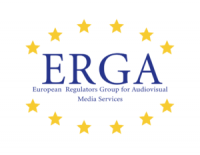ERGA warmly welcomes the adoption of the European Media Freedom Act (EMFA) and expresses its
support for this key piece of legislation. ERGA believes that the EMFA will contribute to the
preservation of media independence, freedom and pluralism, which are core values of our European
democracies. ERGA wishes to express its appreciation for the co-legislators’ effective work and for
reaching an agreement in a relatively short time, despite the complexity and sensitivity of the topic.
2024.gads
ERGA Media Literacy Report 2023
Experiences on the reporting exercise pursuant to Article 33a(2) of the AVMSD
2023.gads
European Media Freedom Act (EMFA). ERGA position paper for the Open Public Consultation.
Media freedom and pluralism are essential pillars of democratic systems based on the rule of law as well as EU fundamental values as solemnly stated by Article 2 of TEU. They enable citizens to form their free and informed opinions and foster the democratic debate. This democratic responsibility of the media is all the more critical in troubled times.
2022. gads
Transposition and implementation of Article 13(1) of the new AVMSD – Ensuring prominence of European works in the catalogues of on-demand audiovisual media services.
The AVMS Directive 2018/1808/EU1 was adopted on 14 November 2018 and published in the EU Official Journal on 28 November 2018. Member States had to transpose it into their national legislation within a period of 21 months, by 19 September 2020. Article 13 (1) of the AVMS Directive sets out a mandatory provision for media service providers of ondemand audiovisual media services in the context of promotion of European works. It states that:
Member States shall ensure that media service providers of on-demand audiovisual media services under their jurisdiction secure at least a 30 % share of European works in their catalogues and ensure prominence of those works.
Recital 35 of the Directive provides some insights on the interpretation of the term “prominence” and sets out a list of possible measures through which prominence can be achieved:
Providers of on-demand audiovisual media services should promote the production and distribution of European works by ensuring that their catalogues contain a minimum share of European works and that they are given sufficient prominence. The labelling in metadata of audiovisual content that qualifies as a European work should be encouraged so that such metadata are available to media service providers. Prominence involves promoting European works through facilitating access to such works. Prominence can be ensured through various means such as a dedicated section for European works that is accessible from the service homepage, the possibility to search for European works in the search tool available as part of that service, the use of European works in campaigns of that service or a minimum percentage of European works promoted from that service's catalogue, for example by using banners or similar tools.
2021. gads
Monitoring of the COVID19 Disinformation - Summary of ERGA’s activities.
The EC’s Joint Communication on ‘Tackling COVID-19 disinformation – Getting the Facts right’ resulted regarding the timeframe of the current study - between August 2020 and June 20211 - in the provision and publication of 47 monthly transparency reports issued by signatories of the Code of Practice. As noted in previous ERGA Reports, the Code of Practice is a unique, global example of an effort to establish cooperation between private companies hosting digital platforms, public authorities, non-governmental bodies, academia, media, and many other relevant stakeholders to fight disinformation. All these stakeholders have an important role to play in finding transparent solutions to the problem of misinformation and disinformation and ERGA appreciates the input and engagement of all these players since the Code was established. However, the pandemic has shown that massive circulation of disinformation online can cause serious harm to citizens across the EU and beyond. Research published by ERGA since the Code was introduced has highlighted significant weaknesses in the Code that need to be addressed if the Code of Practice is to become a more effective tool in fighting disinformation.
2021. gads
Economic impact of the COVID-19 crisis on the media and audiovisual sectors.
The Action Group on the economic effects of the COVID-19 crisis (AG2) was created, in April 2020, following the note on the initiatives to address the pandemic situation adopted by ERGA – “The systemic importance of the media in times of crisis” –, in light of the unprecedented developments caused by the context and the acknowledgement of the vital importance of the media for providing trustful information to citizens and contributing for the survival of democracy.
2021. gads
ERGA Media Literacy Report. Recommendations for key principles, best practices and a Media Literacy Toolbox for Video-sharing Platforms
Media in the 21st century plays an important role in shaping public opinion, framing public debate and engaging citizens. However, media is also a complex endeavour, especially in the context of user-generated content, and as such, Media Literacy (ML) has become one of the most important skills for living in the digital age. However, ML is not just one skill. Rather, it’s a collection of lifelong learning and skills that require to think critically about information obtained from all media including the internet, newspapers, billboards and traditional media, like TV, radio and print. Today’s society is increasingly digitized and more and more social functions are supported by a digital world. Citizens therefore need to be well-prepared and supported when facing the problems and challenges of today’s information society.
2021.gads
Vairāk par ERGA.




